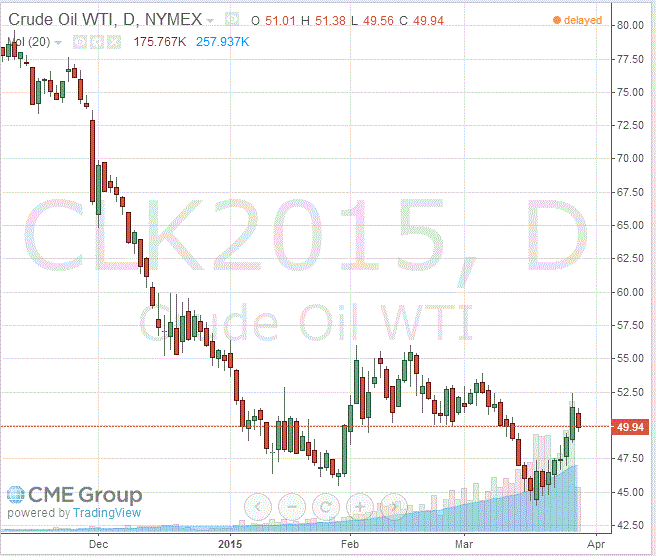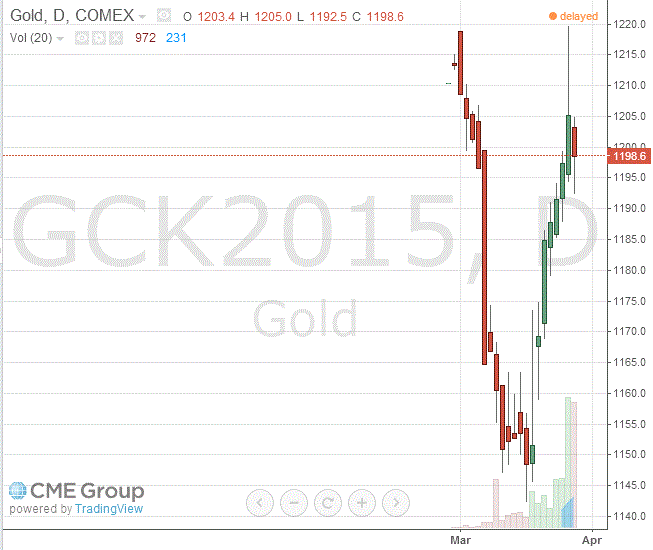Noticias del mercado
-
17:40
Oil: а review of the market situation
Oil prices fell today, dropping below $ 58 (Brent) and $ 50 (WTI), as fears of a disruption of oil supplies from the Middle East because of the conflict in Yemen began to decline, and the focus shifted to the Iranian "nuclear deal" which will take place next week and could increase the supply of oil to the world market.
Since the beginning of the week the price of Brent crude rose more than 4 percent, while WTI oil rose by 9 percent. Most analysts surveyed by expected growth in oil prices next week. 18 out of 35 experts predict a rise in the market, 12 - reduced.
Today, Goldman Sachs analysts said that taking place in Yemen fighting will have little impact on oil supplies. According to them, the country is a small exporter of black gold - mining Yemen is 145 thousand barrels per day. "Yemen - small manufacturer. The rise in prices has raised fears of a possible escalation of hostilities and the transition towards the Strait of Bab el Mandeb," - said analysts.
As for the situation with Iran, experts say ANZ: "a real problem for the oil market is now Iran, negotiations on its nuclear program which reached a decisive stage." "Growing expectations that the transaction between the parties will be concluded by the end of March. Details of a potential agreement is not fully disclosed, but it is clear that the lifting of sanctions could have huge implications for the oil market. Iran currently exports about 1 million barrels. of oil per day, but at different moments of the past year produced more than 3 million. bbl. / day. So, after the sanction will be removed, Iran will not only be able to immediately increase exports, but also to maintain it at a level much higher than the current ", - said the ANZ. However, Goldman Sachs analysts and ANZ note that if Iran and increase exports it is not until the second half of the year.
Little impact on prices also have previously presented data on oil reserves in the United States. Recall, US crude inventories last week increased by 8.2 million barrels and reached 466.7 million barrels, which is a record amount since the beginning of tracking such data in August 1982. Production rose to 9.42 million barrels per day - maximum since January 1983.
May futures for US light crude oil WTI (Light Sweet Crude Oil) dropped to 49.94 dollars per barrel on the New York Mercantile Exchange.
May futures price for North Sea Brent crude oil mix fell $ 0.90 to 57.90 dollars a barrel on the London Stock Exchange ICE Futures Europe.
-
17:20
Gold: а review of the market situation
Gold prices declined moderately, interrupted in this case a series of seven-day increase, due to the weakening of the US dollar and expectations of the speech by Fed Yellen. Experts note that the precious metal may continue to fall, if the head of the Central Bank show hawkish attitude, thus stimulating the US dollar. It should be emphasized, despite today's decline since the beginning of the week gold has risen in price by about 1.3 percent.
Influenced the course of trading on US GDP data. As it became known, the US economy has slowed in recent months 2014 and corporate profits fell, noting weaker base preceding the apparent slowdown in the beginning of this year. Gross domestic product, the broadest measure of goods and services produced in the economy expanded at a seasonally adjusted annual rate of up to 2.2% in the fourth quarter, the Commerce Department said. The result was unchanged from the previous estimate last month. Economists had expected an upward revision to growth of 2.4%. The volume of production in the fourth quarter increased by 2.4% compared with a year earlier, slowing from an annual growth of 2.7% in the third quarter.
The report also said that corporate profits after tax, unadjusted inventory valuation and capital consumption fell by 3% compared to the third quarter. It was the largest quarterly drop in profits in the first quarter 2011. Profit in the fourth quarter increased by 2.9% compared with a year earlier, slowing from the 5.1% annual growth in the third quarter. The overall picture in the last quarter was mixed - consumer spending grew at the fastest pace since 2006, but business investment has slowed and reduced government spending.
Support prices still has a geopolitical tensions. Recall, the international coalition with Saudi Arabia and the Gulf states beginning in Yemen on Thursday night a military operation against insurgents Huthis controlling most of the country. The operation began immediately after the statement of the Cooperation Council for the Gulf States, which noted that Saudi Arabia, Kuwait, Bahrain, the United Arab Emirates and Qatar intend to respond to the request of President Hadi and protect the legitimate authority in Yemen.
"Gold becomes cheaper due to profit-taking and a slight weakening of the dollar. I do not think that traders want to open large positions if the situation in Yemen will not deteriorate," - said the expert Lee Cheong Gold Dealers Ronald Leung.
Meanwhile, an analyst Norbert Ruecker Dzhulias Baer said: "Geopolitics has never been something that can create a trend in gold prices, it is only a short-term deviation from the current trend."
Also today it was announced that the world's largest reserves of the gold-ETF-fund SPDR Gold Trust on Thursday declined by almost 6 tons to 737.24 tons, the lowest level since January.
May futures for gold on the COMEX today fell by $ 6.7 - up to 1196.60 dollars per ounce.
-
01:02
Commodities. Daily history for Mar 26’2015:
(raw materials / closing price /% change)
Oil 51.43 +4.51%
Gold 1,203.60 -0.10%
-

